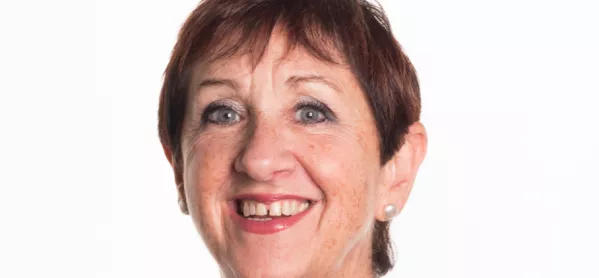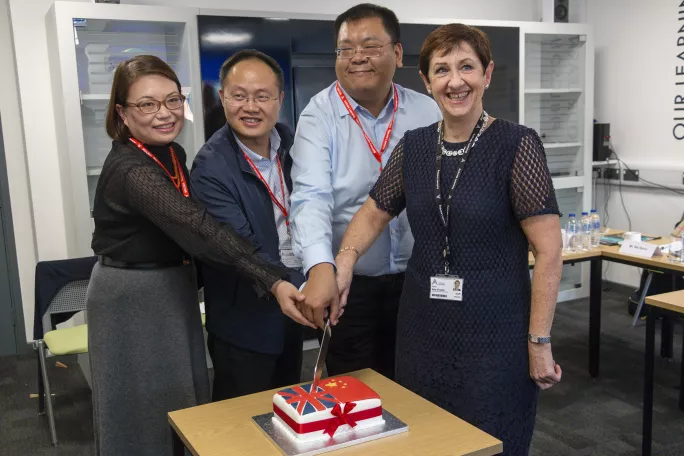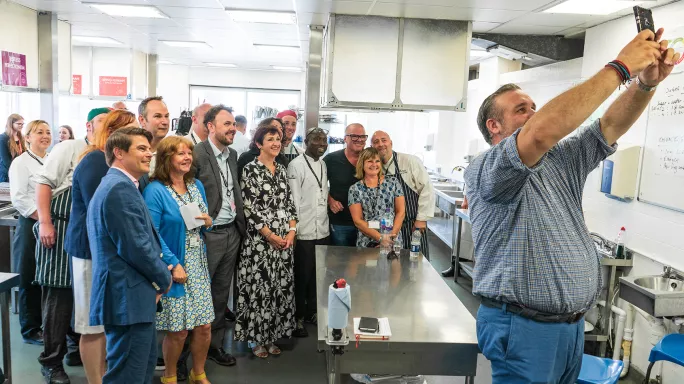- Home
- Meet Sally Dicketts, the new AoC president
Meet Sally Dicketts, the new AoC president

Sally Dicketts says that she wouldn’t describe her leadership style as “cool, calm and collected”.
“What you see is what you get. Everybody says they'd love to play poker with me. They know exactly what is on my face. I'm very, very human in the sense that if I'm cross, you know about it,” she says.
“You read these manuals about how to be a leader, and they all say, ‘people shouldn't see how you’re feeling’. I try very hard to be like a swan, but I’m not.”
Dicketts’ passion for further education, her students and staff is certainly clear to see.
It’s a trait that has seen her through 35 years in FE – and one will stand her in good stead in her newest role as the president of the Association of Colleges.
FE White Paper: What do sector leaders want it to say?
The future of FE: A letter to the next AoC president
Background: Sally Dicketts to become next AoC president
Dicketts says she hated school. She grew up in Cardiff, and failed her 11-plus “so stunningly” that she started in the remedial stream in the comprehensive secondary school.
She remembers her first day: she turned up with a brand new satchel, full of pens – “I always loved pens,” she laughs – and she was the only one in a full uniform. The other children took her satchel and her pens. “They weren’t nasty children,” she says. “They were just curious; they had never seen somebody quite like me.”
Despite being dyslexic, Dicketts was the only one in her class who could read and write. She says it was a “pretty appalling secondary education” full of “constant humiliation”.
It would have been easy for Dicketts to turn her back on education – but she did the opposite. She decided that she would become a teacher: “I didn't think people should ever have to experience what I went through.”

The foray into FE
Dicketts went to Redlands Training College in Bristol and then on to the University of Bristol. Her first school was in Newport, South Wales, before her husband’s job took them to London.
She took a teaching job at Mount Carmel Catholic College for Girls on Holloway Road where she stayed for five years as head of fifth year, head of business studies and head of careers.
Her first foray into FE was to Hackney College in the mid 1980s – she says that she immediately loved FE, as it gave her the freedom to design her own curriculum. Dicketts moved up the ranks to head up the business department, before moving across to Milton Keynes College as assistant principal.
Dicketts spent 15 years at Milton Keynes – the last seven as principal. There was “tremendous change” in that time and colleges left local authority control.
“I remember when I was at Milton Keynes College with all the other Buckinghamshire principals literally sitting going, ‘OK, we're allowed 50 students for hair and beauty, so you can have 25, we'll have 20 and you'll have five’,” she says.
“You know with young people, you might want them only to do engineering, but actually their behaviours and who they are – that’s the most important thing. You can't tell a 16-year-old, ‘you can't be a hairdresser, you must be an engineer’ because they won't do it. So, yes, that was an interesting time.”
Dicketts says she thinks that colleges returning to the public sector, something that has been suggested could be contained in the upcoming FE White Paper, would be a “retrograde step”.
“I think you need to give a level of independence to an organisation in order to create independent beings. If you're going to go back into command and control, then I think education will suffer because most employers want young people and adults who actually are capable of challenging and thinking and problem solving,” she says.
A new challenge
After a decade and a half at Milton Keynes, Dicketts decided it was time for a new challenge.
At the time, there were three struggling colleges in Oxfordshire, and all three principals stepped down. It was decided that the three colleges would be brought together in a merger – the first of its kind – with one principal.
Dicketts was appointed to be that principal. She says that all colleges were all “financially in a really bad way” and there were no senior managers left. Dicketts wanted a challenge – and she sure got one.
“Having been in Milton Keynes for so long, I thought, ‘Oh god, maybe they'll discover I'm useless’. I remember saying to my partner, ‘Let's not put the house on sale now, because what happens if I was just great at Milton Keynes, but actually, when I go somewhere else, I’m not?’ A very typical woman,” she says.
“I was really nervous. I can remember that awful feeling like it was the first day at school. But then, like all colleges, there were marvellous people there.”
Dicketts joined in October 2003, by January 2004 a new team was in place, and together they reshaped the organisation. When Ofsted came for an inspection a few months later, the college gave themselves a grade three; Ofsted gave them a grade two.
While that grade was a “real highlight”, there were more tough times ahead. Dicketts says the colleges were “hit hard” by the cuts in the adult education budget – and in 2008-9, when the governing body was writing their strategic plan, it became clear that FE was not going to be invested in “in a big way”.
Together with her leadership team, Dicketts decided that the colleges would have three key drivers – globalisation, neuroscience and technology – and that they would grow the group to the size of a small polytechnic university.
Slowly but surely, the group took over colleges and opened university technical colleges (UTCs) and secondary schools. It rebranded as Activate, and today, the group comprises seven colleges, seven schools (including four UTCs) and two training providers. They also have a range of colleges operating in Saudi Arabia.
Dicketts says that she cares hugely about the students and their learning – after all, she knows for herself what it feels like to be disconnected and unhappy in education.
“One of the things I find really frustrating is when people say, ‘the kids who aren't brilliant go to the FE college’, and I think: ‘yes, that's how people described me’. And actually, I now know that I am clever, and thanks to some amazing people in my life, I've become cleverer.
“We have a very clear learning philosophy: it’s that you have a brain and your brain is like any other muscle in your body. If you’re prepared to work and put the effort in, that brain can succeed like the rest of us. But why don't we do it? The next part of our philosophy is motivation.
“Why should you bother if you've been told you're stupid? If you are belittled and feel frightened physiologically, you turn off your thinking brain and you can't learn. What we're trying to do is create a very different learning environment. A lot of people go to me, ‘Well, you're not number one in the league tables’. And I say, ‘No, we're not – and that's OK’."
That learning philosophy doesn't happen overnight, says Dicketts: to improve learning, you have to build confidence and give students lots of practice.

The FE White Paper and making an impact
The reform of the further education sector won’t be a quick fix either, says Dicketts – and in the FE White Paper, the government must decide what exactly it wants from colleges.
“If you're doing the White Paper because of failing colleges, that's not the best thing unless you know why they're failing. It's a bit like a failing student: there are myriad reasons why institutions fail,” she says.
Dicketts says that the DfE should look abroad to how other skills systems operate, but equally, we need to accept our culture.
“Cultures are very different. You can't just take what's in Germany and plonk it in Britain. You just need to learn and accept your culture. We need to value what we've got; we always look at the failing colleges, but we've also got some amazing colleges,” she says.
"Why don't we try to replicate what's going on in the best ones? Why does everything have to go to the failing ones?"
She says the White Paper was a big part of why she chose to run for the AoC presidency. “I haven't got a clue what impact I’ll make, but I would like to have an impact,” she says.
Dicketts says that technology and exams – trying to encourage the DfE and Ofqual to look at the possibility of conducting exams online – is also really important to her, as is the BLM movement, equality in colleges and governance.
“We have a governance structure that looks after schools, has HE, we’ve got apprenticeships and structure for those, we’ve got FE and we’ve got a corporation based on the 1993 act. We haven’t looked at that – we expect a huge amount from our governors and we have amazing governors, but I think that the structure they have to work under needs overhauling,” she says.
One thing's for sure: if Dicketts tackles everything on that list, she will sure have plenty of opportunities to make that impact.
Keep reading for just £1 per month
You've reached your limit of free articles this month. Subscribe for £1 per month for three months and get:
- Unlimited access to all Tes magazine content
- Exclusive subscriber-only stories
- Award-winning email newsletters



